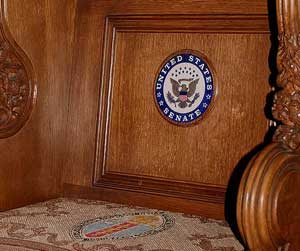
Photo used under Creative Commons license by Flickr user <a href="http://www.flickr.com/photos/bootbearwdc/">dbking</a>.
In Nick’s post about Ted Kennedy’s torch passing to Obama, he wrote that the late senator’s seat would be empty for nearly six months while a special election is organized “unless Massachusetts Dems change the law.” Reports out of the state capital suggest that may happen when the Massachusetts legislature returns to session.
Up until 2004, the state did not require special elections to fill mid-term Senate vacancies. John Kerry’s campaign for the presidency prompted Massachusetts Democrats, who feared that then-Governor Mitt Romney would appoint a Republican if Sen. Kerry prevailed, to require elections be held no sooner than 145 and no later than 160 days after a Senate seat is vacated. As Nick noted, one missing vote from the reliably Democratic state of Massachusetts could effectively endanger the passage of health care reform in the filibuster-fearing Senate.
On July 2nd, aware of this impediment to his succession at such a critical time, Kennedy wrote Massachusetts state lawmakers asking them to replace him quickly on his death. The New York Times observed that, “Though he did not cite any issues specifically, his note was viewed as an acknowledgment that his absence would leave uncertain… the essence and fate of health care reform, his most cherished legislative goal.”
It is increasingly looking like Massachusetts’ lawmakers may honor the late senator’s dying plea. Yesterday, the Boston Globe reported that state Senate President Therese Murray, “who had privately expressed quite vehement opposition” to Kennedy’s request, may have changed her mind. Today, Governor Deval Patrick announced his support for Kennedy’s plan, citing “the momentous change legislation that is pending in the Congress today.”
No one will know for certain how the state legislature will address the succession issue until they return from recess after Labor Day, but this is certainly one ray of light for advocates of health care reform on an otherwise dark day.










